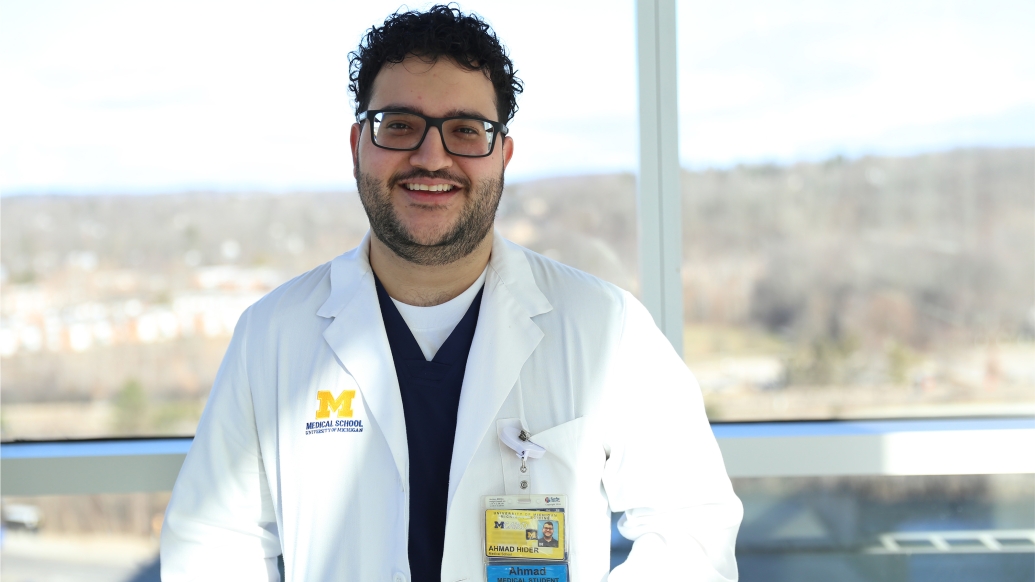A fourth-year medical student advocates for better awareness around cystic fibrosis with help from the Clinton Foundation
5:00 AM
Author |

As a fourth-year medical student at the University of Michigan Medical School, Ahmad Hider is already quite impressive. But in addition to being an aspiring physician, Hider is also a fellow at the Clinton Global Initiative University, or CGI U, a community of individuals committed to developing innovative solutions to various worldwide problems.
“I’m really honored to be a part of this community of innovators,” said Hider. “The opportunity to connect with leaders in technology, health care, business and other fields has been tremendous. Our cohort of students is constantly learning from one another and pushing each other to implement our diverse platforms.”
When Hider first learned of the CGI U, he submitted an application about his “commitment to action,” which focused on improving the lives of patients with cystic fibrosis.
“My younger brother has cystic fibrosis, and this inspired a lot of my work as a medical student. In fact, it’s the reason why I entered the field of medicine in the first place,” said Hider. “In my clinical year, it has been a profound experience to work with patients with this condition and it’s definitely something I want to continue throughout my career.”
Hider notes that his passion for advocacy surrounding cystic fibrosis ultimately laid the groundwork for his commitment to action with the CGI U.
“Our general understanding of cystic fibrosis has dramatically improved since the 1930s,” said Hider. “But if we look at countries like Egypt, Turkey and Ethiopia, for example, they’re categorized as low-to-middle income countries with a life expectancy rate of just 10 to 15 years for individuals with the condition. When we compare this to countries with higher incomes, the life expectancy rates often exceed 50 years of age. Obviously, there is a huge disparity here that needs to be addressed.”
According to Hider, there is a general lack of awareness around cystic fibrosis in lower income countries, which yields poor patient care and ultimately, lower life expectancy rates.
SEE ALSO: Dismantling racism in medicine (michiganmedicine.org)
“This inspired me to partner with my foundational mentor, Samya Nasr, M.D., who is a pediatric pulmonologist at C.S. Mott Children’s Hospital,” said Hider. “She has been incredibly influential in the world of cystic fibrosis and our goal became creating a global registry for patients with the condition. By tracking which countries are the most impacted by cystic fibrosis, as well as the resources needed to improve patient life expectancy rates, we hope to improve the lives of individuals across the world who are impacted by this disease.”
In partnership with the Cystic Fibrosis Foundation, Hider plans to work on this initiative throughout the year, with continued mentorship from the Clinton Foundation, in addition to his course electives and other medical school-related obligations.
“I know it’s a huge undertaking, but this work means a lot to me,” said Hider. “The first stage revolves around identifying the countries within our registry and where access to care and treatments will be assessed. Then, we will focus on pushing past that stage and getting our feet wet by really implementing the work.”
Hider says that his ultimate goal is to create a curricular educational system that can be provided to hospitals and other health care facilities that truly don’t have a full understanding of what cystic fibrosis is.
“There are countries in this world that don’t even identify cystic fibrosis as an actual disease,” said Hider. “By distributing this curriculum, we can drum up awareness around patient data and then advocate for more resources to be sent to these countries when needed.”
Hider is currently thinking about pursuing general surgery as he continues in his medical career. However, advocating against health inequities and improving the lives of others will always remain at the forefront of all that he does.
“I’ve witnessed many disparities in medicine, especially as a clinical student. Many of my patients come to me with factors in their lives that are out of their control,” he said. “Social determinants of health play an important role in health outcomes. And addressing concerns ranging from medication accessibility to transportation ultimately impacts the lives of patients and patient care. We all know that improvements in health care are needed, and the patients are the ones who continue to inspire me. I want to make it my life’s work to improve access to health care, as well as the lives of others.”

Explore a variety of health care news & stories by visiting the Health Lab home page for more articles.

Department of Communication at Michigan Medicine





